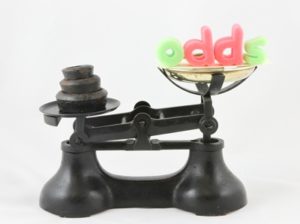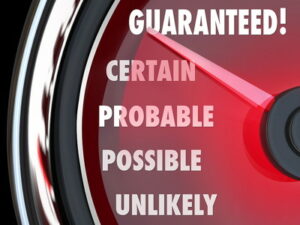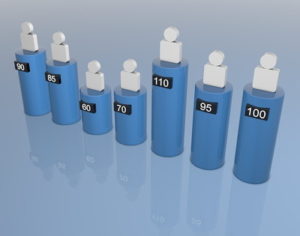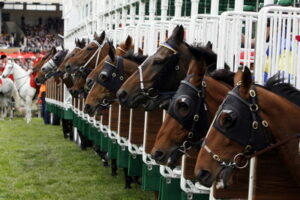 When someone is considering placing a bet, they will often fail to properly consider the true odds of what it is that they are betting on. The best bettors will always look to consider the true odds of the wager that they’re thinking of placing, but that is a rare thing for the majority of punters.
When someone is considering placing a bet, they will often fail to properly consider the true odds of what it is that they are betting on. The best bettors will always look to consider the true odds of the wager that they’re thinking of placing, but that is a rare thing for the majority of punters.
It becomes even trickier when the odds of what we’re betting on are either very low or very high. Interestingly, we become quite good at assessing things when the odds are 50/50 or close to it, at which point we tend to be able to assess what we’re betting on relatively well in comparison.
The fact that so many people are happy to play the lottery in spite of the astronomical odds of winning it shows that we are often weighing probability from our intuition rather than the actual likelihood of something happening. The same logic is why betting on your favourite sports team is often not a very good idea, with people failing to consider the Expected Value of a wager and instead going with how they feel about a wager.
People will often underrate rare events and overrate those that aren’t as rare, which can be problematic when you’re thinking bets to place.
Qualitative Impressions
 Consider the chances of winning a bet when they improve by the same quantitative change. Each of these options represents the same change quantitively, but emotional gain a different reaction:
Consider the chances of winning a bet when they improve by the same quantitative change. Each of these options represents the same change quantitively, but emotional gain a different reaction:
- From 0% chance to a 5% chance
- From a 5% chance to a 10% chance
- From a 60% chance to a 65% chance
- From a 95% chance to a 100% chance
In each example, the actual outcome has only shifted by 5% in terms of likelihood, but how we feel about the bet will have changed in substantially different ways depending on the example that we’re looking at.
When our chances move from 0% to 5%, we only have a 0.05% chance of winning our bet but it has gone from no chance to a slight chance. This move into the possible triggers a positive emotion, known as the possibility effect, resulting in many gamblers then overweighing the likely outcome of long shots. It is why people tend to play the lottery, wherein there is a tiny chance of winning but the jackpot is huge, therefore seemingly making it worthwhile because there is a slight chance that it will happen.
Moving from a 5% chance to a 10% chance is the same increase of 5%, but, as with the move from 60% to 65%, it has a less dramatic impression. In the first one, your chance of winning the bet has actually doubled, but the qualitative impact is negligible.
This isn’t the case with the final option, however. This moves the outcome from possible to certain, which actually produces an inverse of the possibility effect. The certainty effect means that outcomes that are close to certain are actually underweighed in comparison to their actually probability.
Super Value Is Often Ignored
 Though weighing up probabilities will present bettors with extreme benefits, many still choose to bet on one outcome over another because they believe that it is a more likely occurrence without thinking about superior value.
Though weighing up probabilities will present bettors with extreme benefits, many still choose to bet on one outcome over another because they believe that it is a more likely occurrence without thinking about superior value.
There is evidence to suggest that a subject matter that evokes a vivid emotional representation often results in the declining of an objective use of probability. Think of discussions that you’ve had with friends or partners around the idea of what you would do if you won the National Lottery jackpot. This vivid imagining often leads to an overweighing of the chance of winning.
In a similar way, betting on your favourite team or play isn’t sensible because the likelihood is that your emotional attachment to them will generate a more vivid sense of the outcome that you want actually occurring.
By ‘thinking the ball into the net’, you end up overweighing the probability of it happening and therefore choosing bets with poor value. Instead, you need to forget about what you want to happen and consider what is likely to happen. This requires a degree of emotionless thinking, which isn’t an easy to thing to do when you have some sort of emotional investment.
Wording Matters
 The ability to make a valuation around a bet’s Expected Value is easier when the wording of the bet is easy to understand. Even a subtle variation in the world of a bet can make a huge difference.
The ability to make a valuation around a bet’s Expected Value is easier when the wording of the bet is easy to understand. Even a subtle variation in the world of a bet can make a huge difference.
Think of an exchange that allows you to back a horse ‘versus the field’ compared to one that lists every horse taking part in the race. The former is clean and simplistic when it comes to how the bet works, meaning that punters are more likely to line up the Expected Value with true probability. The complicated nature of the latter means the opposite, however.
The interesting thing here is that listing all of the horses is no different to say ‘versus the field’ in a literal sense, but the fact that it seems to complicated will often lead punters to abandon any plans to weigh up the probability of their chosen horse beating all of the others horses one by one and will instead go with their intuition.
In 1999, Craig Fox and Amos Tversky asked a group of basketball fans in the United States of America to assess the chances of the eight quarter-finalists in the play-offs of the NBA. They judged it one team at a time, rather than looking at them all together.
Without being able to engage in proper calculations, judgements tends to underweigh probabilities. When the participants carried out the task they overweighted the outcomes to 240%, but when they were asked to look at the Eastern and Western Conference’s likely winner they were closer to 100%.
This is why bookmakers tend to offer complex wagers rather than move to keep things as simple as they can. The more complex a bet is that they offer, the more likely it is that punters will get confused about the genuine likelihood of an outcome and instead favour intuition, which is more likely to lose them the bet.
